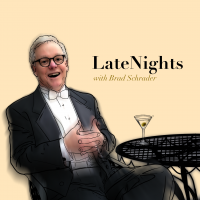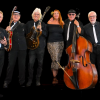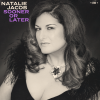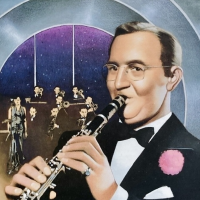Home » Jazz Musicians » Cole Porter
Cole Porter
WHILE the 1920's ended on December 30, 1929--and a far different political, social, and sociological climate prevailed during the ensuing decade--a number of highly gifted writers managed to keep alive in the musical theater of the 1930's some of the feverish spirit and the unconventional attitudes of the "roaring Twenties." The most significant of these was Cole Porter. In his lyrics and melodies--for like Irving Berlin he wrote both--he fixed the smartness and cynicism, the freedom in sex attitudes, the lack of inhibitions in speech and behavior, and the outright iconoclasm that had characterized the 1920's. He is the arch cynic to whom a crushing love affair was "just one of those things" and who could be true to his girl "only in my fashion." He is the dilettante who sprinkles throughout his lyrics cultural, literary, and geographical allusions of a well-read, well- educated, and well-traveled person. He is the nonconformist unafraid of the erotic, the exotic, or the esoteric. He is the sensualist who brings to his melodies throbbing excitement, purple moods, irresistible climaxes. Most of all he himself is like a character from a novel of F. Scott Fitzgerald. All his life Cole Porter was the avid hunter of excitement, adventure, and gaiety; all his life he traveled under the banner of "anything goes". He was the sybarite to whom the good things of life was almost a religion. Provocative in his attitudes, unpredictable in mood and action, irresponsible in behavior, he was truly a living symbol of the decade in which he first achieved maturity as a song writer. His background was unique among American popular composers in that he was born to wealth, and that his apprenticeship took place not in Tin Pan Alley but in the playgrounds of Europe. He was born in Peru, Indiana, on June 9, 1891, to a family that had accumulated vast wealth through speculations in coal and timber. A comprehensive academic education carried him through Yale, from which he was graduated in 1913. His musical training had also been all-inclusive, beginning with the violin and piano in boyhood, continuing at the Harvard School of Music after he left Yale, and ending some years after that at the Schola Cantorum in Paris with Vincent d'Indy. Porter had written a complete operetta (words as well as music) when he was only ten; a year later he had a piano piece published; at seventeen he had his first popular song issued in Tin Pan Alley, "Bridget"; by nineteen he had written two famous college songs, "Bingo Eli Yale" and "Yale Bulldog Song"; and in 1916 he completed his first score for a full-length Broadway musical comedy, America First, described in the program as "a patriotic comic opera," in which Clifton Webb starred as a titled Englishman.
Read moreTags
The Great American Songbook Goes To The Movies

by Joan Merrill
Broadway bombed. Hollywood boomed. Movies learned to talk. The stock market crashed in 1929 and burst the popularity bubble of Broadway. Going to see a play or a musical was common practice in the Roaring Twenties. There were hundreds of them playing on the Great White Way and millions of Americans of all classes bought tickets. Then came Black Tuesday and the Great Depression. People could not afford Broadway anymore. But out West in sunny California ...
Continue ReadingLateNights With Brad Schrader - Bringing Back Cocktails, Cole Porter And Classy Evenings!

Source:
Scott Thompson Public Relations
Album LateNights I make it my goal to carry the torch of the American Songbook to a new and younger audience, to keep this great music alive among us. For LateNights we wanted to bring an easy, night-out-with-a-cocktail vibe to our listeners—something we try to bring to our live shows. We bring a cross-section of standards—and not-so-standards—with fresh arrangements to make things easy and interesting. Our superb band of jazz veterans builds a chill groove under and around the vocals, ...
read more
Vocalist And Poet Lisa B (Lisa Bernstein) Releases "I Get A Kick: Cole Porter Reimagined" On Jazzed Media, Available January 19, 2018

Source:
Mouthpiece Music
LISA B (Lisa Bernstein) is not only a jazz singer and songwriter, she’s also a widely published poet and spoken word performer. On I Get A Kick: Cole Porter Reimagined, her latest CD and sixth as a leader, she applies her poetic prowess and vocal gifts to fresh interpretations of ten tunes by Cole Porter, one of the finest of the lyricists and composers (unconventionally, he was both) who created the Great American Songbook. According to Lisa B, “My five ...
read more
Enter the "Cheryl Bentyne - Let's Misbehave: The Cole Porter Songbook" Giveaway at All About Jazz!

Source:
All About Jazz
All About Jazz members are invited to enter the Summit Records “Cheryl Bentyne - Let's Misbehave: The Cole Porter Songbook“ giveaway contest starting today. We'll select FIVE winners at the conclusion of the contest on December 24th. Click here to enter the contest
(Becoming a fan of Cheryl Bentyne at AAJ automatically enters you in the contest.)
Good luck! Your Friends at Summit Records About Let's Misbehave: The Cole Porter Songbook
…30 years - the reigning soprano with ...
read more
Illness, Recovery & Cole Porter: Bentyne's Joyous New CD With James Moody

Source:
Amy Blum
Los Angeles, CA—When soprano Cheryl Bentyne was recovering from cancer treatment and starting again to sing, it was to Cole Porter she first turned as her “saving grace.” With his songs fresh in her mind from recently recording Let’s Misbehave—The Cole Porter Songbook—Cheryl connected with Porter’s ability to “cover the human condition,” healing along with the music she calls “perfect, joyous and a thrill to sing!” Now, nearly a year after the diagnosis, followed by surgery and chemo, Cheryl—for 30+ ...
read more
Jazz Musician of the Day: Cole Porter

Source:
Michael Ricci
All About Jazz is celebrating Cole Porter's birthday today!
WHILE the 1920\'s ended on December 30, 1929--and a far different political, social, and sociological climate prevailed during the ensuing decade--a number of highly gifted writers managed to keep alive in the musical theater of the 1930\'s some of the feverish spirit and the unconventional attitudes of the “roaring Twenties." The most significant of these was Cole Porter... Read more.
Place our Musician of the Day widget on your website or ...
read more
David Leonhardt's Piano and Band Play Cole Porter

Source:
Gapplegate Music Review by Grego Edwards
Looking at the selection of 12 songs played by pianist David Leonhardt and his group on Plays Cole Porter (Big Bang BBR9584), you are immediately reminded of how central Porter's best songs have become in the standard jazz repertoire. These songs have served as excellent vehicles for many of the bop and after masters. So what can Dave Leonhardt and his entourage do that hasn't been done before? The answer is that David sums up the sorts of treatments pianists ...
read more
Cole Porter's Songs This Week on Riverwalk Jazz

Source:
Don Mopsick
This week on Riverwalk Jazz, singer Nina Ferro joins The Jim Cullum Jazz Band for a concert of Cole Porter compositions live from the Filoli Estate in California. The program is distributed in the US by Public Radio International, on Sirius/XM sattelite radio and can be streamed on- demand from the Riverwalk Jazz website. You could say that Cole Porter was born with a platinum, jewel-encrusted spoon in his mouth. He enjoyed being “rich-rich." And this was before he made ...
read more
Jazz Musician of the Day: Cole Porter

Source:
All About Jazz is celebrating Cole Porter's birthday today!
WHILE the 1920\'s ended on December 30, 1929--and a far different political, social, and sociological climate prevailed during the ensuing decade--a number of highly gifted writers managed to keep alive in the musical theater of the 1930\'s some of the feverish spirit and the unconventional attitudes of the “roaring Twenties." The most significant of these was Cole Porter...WHILE the 1920\'s ended on December 30, 1929--and a far different political, social, and ...
read more
Gene Ludwig: "Love Notes Of Cole Porter"

Source:
Chris M. Slawecki
As one of the early adopters of the Hammond organ in jazz after Jimmy Smith revolutionized the instrument in the late 1950s, Gene Ludwig enjoyed the massive popularity of organ-based soul jazz during the 1960s. In those days, “organ rooms" popped up all along the East coast and Midwest, especially in the inner working-class cities like Detroit, Chicago, Philadelphia, Newark, and Gene's stomping grounds of Pittsburgh. Gene worked them all, bringing his swinging style to audiences far and wide. His ...
read more
East Coast pianist Betty Liste interprets timeless masterworks of Cole Porter, Miles Davis, and others on second album
Source:
Lauren Rogers
Pianist Betty Liste continues her explorations of American pop standards with her second album, Jazz Ventures (Pure Communications). Liste interprets the timeless masterworks of Cole Porter, Miles Davis, and Antonio Carlos Jobim, among others, with youthful exuberance, emotional depth, and impressive skill.
Liste's selection of covers reveals the dazzling range of her playing, from the percolating Latin stomp of Thelonious Monk's “Well, You Needn't" to the breathtaking swing of “East of the Sun" to the moving romanticism of “I Fall ...
read more














































